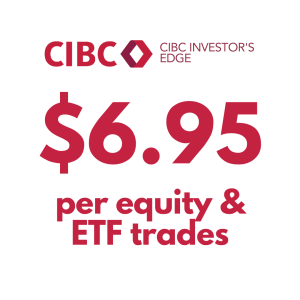
Whether we like it or not, banking has become a routine part of our lives. We use our bank accounts to accept pay cheques, pay bills, buy things online or spend at a store. Because banking is central to how we live our lives, it’s important that you’re using an efficient and affordable solution. If you find your bank fees are too high or the customer service hotline has long wait times, you might consider switching banks for better service. In this guide, we’ll explore reasons why you might want to switch banks, what to look for in an ideal bank, and how to switch banks in Canada. Keep reading to learn more!

Table of contents
Why would someone want to switch banks in Canada?
In the modern world, there are an array of banks to choose from. When you choose a bank, it can be a hassle to switch in the future. So why would someone be motivated to switch? According to various studies, these are common reasons someone might want to switch banks:
- High Fees. Between monthly fees, ATM fees and overdraft protection fees, many feel they are paying too much for their money to be held. Switching to a cheaper bank can be a lucrative way to save money.
- Low Interest Rates. If your money is sitting in a bank account, it’s ideal if it’s earning interest. However, if the rate of interest is low, you might want to switch to earn more on your idle money.
- Customer Service. Have you ever sat on the phone for hours to inquire about a random charge on your credit card? The experience can leave you feeling frustrated. For this reason, many switch banks for faster, more reliable customer service.
- Poor Platforms. Online and mobile banking has become a routine part of everyday life. But if the platforms aren’t user friendly or take too long to load, you might consider switching to a bank with a better virtual experience.
- Location. Visiting a branch used to be the only way to deposit cheques, withdraw money and pay bills. But now, most of this can be done online from the comfort of your home. If you don’t require a physical branch to do your banking, you might switch to an online bank. Usually they have lower fees too because they don’t operate brick and mortar branches.
CIBC Investor’s Line Offer
Up to $6.95 per online stock or ETF trade. Plus, there’s no minimum account balance.
Is there a downside to switching banks?
The process of switching banks can be time consuming. For instance, if you receive your pay cheque by direct deposit, you have to contact your employer to make the change on payroll. Also, if any of your bills are automatically withdrawn from your bank account, that will have to be updated too. All of the paperwork to change your banking information can take time and consideration. Thankfully, this only needs to be done once when you switch. When the process is complete, you can return to business as usual.
In addition, there is often a cost to switching which is usually just one time. These can be initiation fees with your new bank or closing fees with your old bank. Further, it’s often quite easy to open a new bank account but you might need to jump through more hoops to close an account.
Related Reading: How to Switch Financial Advisors
Is it easy to switch banks in Canada?
Yes, switching banks in Canada is easy. The general process is to open a new bank account, transfer your balance, switch over all your automatic deposits and withdrawals, then close your old account. The process can be time consuming and there might be some costs of switching, but overall it’s quite simple.
Does switching banks affect your credit score Canada?
No, switching banks does not affect your credit score. Activity from your chequing and savings accounts is not reflected in your credit report. So, opening a new chequing and savings account does not impact your score.
However, if you’re planning to open a new credit card or line of credit as a part of your plans to switch banks, that can impact your score. These accounts are reflected in your credit report, so the bank may request a credit check. This would result in a hard inquiry which has a slightly negative impact on your credit score. Fortunately, it will drop off in the short term and your score will recover. So long as you manage the new debt responsibly, your credit score will remain the same or even improve.
Related Reading: Variable vs Fixed Mortgage: What to Know
CIBC Investor’s Line Offer
Up to $6.95 per online stock or ETF trade. Plus, there’s no minimum account balance.
Can I transfer my bank account to another bank in Canada?
You can’t exactly transfer one bank account to another institution in Canada. However, you can open a new bank account, transfer your balance, switch over your deposits and withdrawals, then you can close your old account. Unfortunately, you have to do most of the work on your own. It’s not as simple as transferring a bank account to a new institution. There needs to be a transition from an old account to a new one.
Do I have to close my old bank account when switching?
Yes. After opening a new account, transferring your balance, and updating deposits and withdrawals, you’ll need to close your old bank account when switching. Otherwise, you might end up paying unnecessary fees. Plus, you don’t want an active account that you don’t use or need. It’s just good housekeeping to close old accounts you’re not using!
How to Choose a New Bank
If you’re not satisfied with your bank, but aren’t sure how to choose a new one, it can be helpful to consider a few factors. Let’s take a closer look at what to consider when choosing a new bank:
- Bank Locations. Do you frequently withdraw cash or use in-person bank services? If so, it’s helpful to have a close by ATM or branch. That way, you’re cutting down on the amount of commuting you have to do to access banking services. But on the flip side, if you primarily bank online, a bank without a close location isn’t as important.
- Fees. The fees you pay depends on what banking services you use. For instance, if you often use e-transfer, try to find a bank that has reduced or no fees for this service. Or, if you frequently use direct deposit or automatic withdrawals, it’s best if you can find an account with unlimited, free transactions. Whatever banking services you use, try to find a bank that offers those services for cheap, or better yet, free.
- Interest. Deposit interest is the money paid on the balance you hold in your chequing account. The higher this rate, the better. In addition, you might want to consider interest rates on other financial products with the same institution, such as GICs or high interest savings accounts.
- Online Services. These days, most banks offer complete online banking services, but it’s worthwhile to explore the ins and outs. Consider the user experience and accessibility, such as whether they have a mobile app or not.
- Customer Service. When it comes to your money, you want to make sure you have a good team to support you. Read reviews of other’s experiences online, such as on independent platforms like Reddit.
- Welcome Bonuses. Some banks offer promotional bonuses when you open a new bank account. This can be in the form of a cash bonus or points as a part of their rewards program. If you’re switching banks anyway, you can capitalize on these welcome bonuses.
Related Reading: What Is The Best Bank In Canada?
How to Switch Banks in Canada
Ready to switch banks? Below is a step by step guide on how to switch banks in Canada:
- Step One: Open Your New Account. Once you’ve chosen a new bank you want to work with, it’s time to open an account. Usually, this step is quite easy because banks want you to deposit money with them. The only requirement is providing some personal information about yourself.
- Step Two: Transfer Your Balance. When the account is ready to use, transfer your cash balance from your old account to your new account. You can use an e-transfer, wire transfer, cheque, bank draft, or electronic funds transfer to complete the process. Then you’ll be ready to start using your new account. Leave some cash in the old account if you have fees or upcoming payments to ensure you’re not overdrawn while the accounts are run parallel.
- Step Three: Identify and Switch Automated Transactions. Most of us automate our pay cheque deposits and bill payments with modern banking. Before closing your old account, these need to be transferred to your new bank account. Identify all of these transactions using a recent bank statement and switch the payment information accordingly.
- Step Four: Close Your Old Bank Account. Once your new account is up and running, it’s time to close your old bank account. Be sure any remaining cash has been completely transferred to your new account before starting this process. When you’re ready, simply contact your bank or visit a branch and request the account be closed. You might be asked to complete a customer satisfaction survey during the process, feel free to be honest about why you’re switching banks!
Once you complete all these steps, you will have successfully switched bank accounts!
Related Reading: Best Places to Retire in Ontario
CIBC Investor’s Line Offer
Up to $6.95 per online stock or ETF trade. Plus, there’s no minimum account balance.
Is it worth it to change banks?
Since it’s not exactly feasible to store cash at your home, most of us opt to use banking services. In addition, it makes receiving and spending money a lot easier. If you’re not satisfied with your bank for any reason, it is definitely worth it to switch banks. After all, we use our bank accounts on a weekly, sometimes even daily, basis. The cheaper and easier they are to use, the better!
Do you need assistance choosing a new bank, but aren’t sure where to start? A financial advisor can help! Complete this quick questionnaire to be matched with one today!
Read More: Banking vs Financial Services: What’s the difference?

